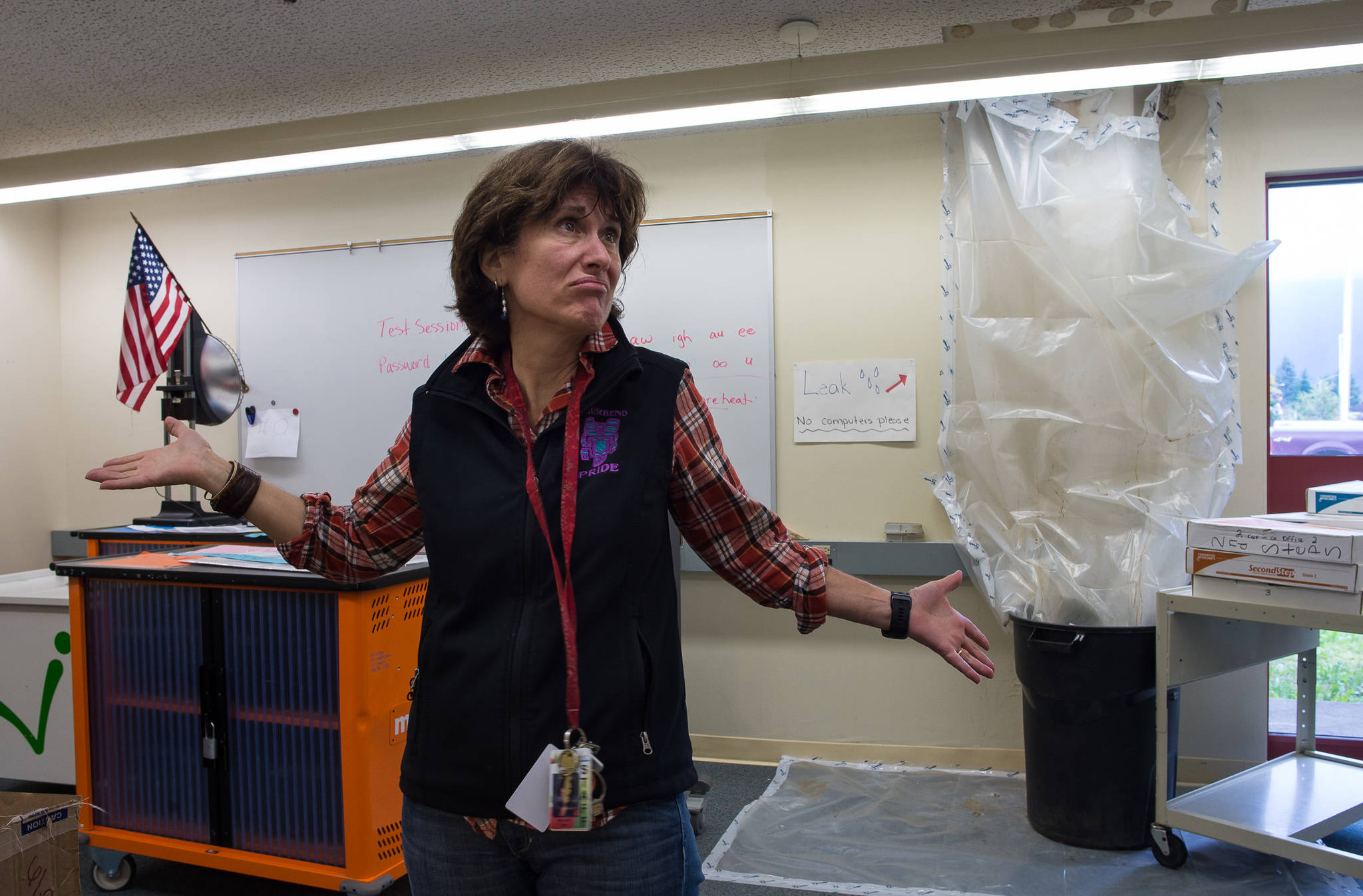As Riverbend Elementary teacher Katie Koski read aloud to her kindergarten class, a sight that’s become commonplace at Riverbend hung above them.
Directly above a child wearing Spiderman gloves, a bucket hung from one of the fluorescent lights to catch the water that’s been seeping through the ceiling. David Means, the Director of Administrative Services for the Juneau School District, said the roof has been leaking there for about three years.
As she stood next to a sign in the school’s computer lab that pointed out a leak in the ceiling, Riverbend Principal Michelle Byer said the renovation needs can be a distraction.
“It’s sad because there’ll be instruction going on and ceiling tiles will fall,” Byer said.
One of the recurring topics at city meetings and Board of Education meetings is the need for repairs and for budgetary help across the school district, and if voters approve the extension of the 1 percent sales tax increase in the Oct. 3 election, $5 million of that revenue over the next five years will go to the school district for maintenance. Means said the district hasn’t yet identified exactly where the money would go, but the roof at Riverbend is a priority.
City and Borough of Juneau staff members estimate that continuing the 1 percent sales tax increase will net the city about $47 million over the next five years. The CBJ Assembly Finance Committee examined a list of 26 possibilities for how to spend the money and whittled it down to 13 items.
The biggest allocation on the list is for wastewater maintenance, which would receive $13.5 million over the next five years. The plan also allocates $5 million for both JSD and Augustus Brown Pool maintenance.
The wastewater systems, CBJ Engineering Director Roger Healy explained, require a great deal of money for a few reasons. Like with many other departments in town, state funding has decreased over the past two decades for wastewater treatment, Healy said. More of the burden has fallen on municipalities to pay.
It’s also a fairly complex system, Healy said, and the toxicity of wastewater puts a great deal of stress on the equipment.
“It’s not like distilled water we’re dealing with,” Healy said. “The substance has its own corrosivity. Things wear out. Machines wear out. Blowers wear out.”
There are a few specific projects on the horizon for the three treatment plants in town. Though Healy’s staff is only estimating at the moment for future projects, the biggest one in the next few years will be a roof renovation at the Juneau-Douglas Wastewater Treatment Plant that is estimated to cost around $4 million.
Not flashy, but still important
During the Chamber of Commerce’s candidate forum this past Thursday, current Assembly member (running for re-election this fall) Jesse Kiehl stressed that this focus on maintaining infrastructure will help keep everything else running smoothly in town.
“When it comes to economic growth, the most important thing I think the city can do is maintain the infrastructure we have,” Kiehl said.
When the 1 percent sales tax increase was on the ballot in 2012, there was less of an emphasis on maintenance and improvements. The only maintenance projects in that ballot proposal were for harbors, recreational facilities and Capital Transit facilities. Revenue from the tax also went to the new library facility at Dimond Park and a new water filtration system at Salmon Creek among other projects. That proposal passed, with 58.5 percent of voters voting in favor.
This time around, the ballot proposal isn’t packed with new and exciting endeavors, which might not grab voters’ attention as much. Means pointed out that just because the ballot proposal isn’t flashy doesn’t mean it’s not worth a vote.
As an example, Means pointed to a computer in the basement of the Marie Drake Building that houses both Yaakoosgé Daakahídi Alternative High School and Montessori Borealis. Means identified this computer as an IBM XT 286, a computer that was first released in the 1980s. This computer, which might look more at home in a museum, runs the heating controls at the building, Means said.
Though Means said the school district isn’t planning on using the $5 million from the ballot initiative on replacing this particular computer, it’s indicative of the kind of behind-the-scenes issues that need to be addressed.
“It’s those things we’re concerned about sometimes,” Means said. “It isn’t the flashy things that people can see, sometimes it’s the hidden things that are underneath our infrastructure at our schools that we’re concerned about.”
• Contact reporter Alex McCarthy at alex.mccarthy@juneauempire.com or 523-2271.

